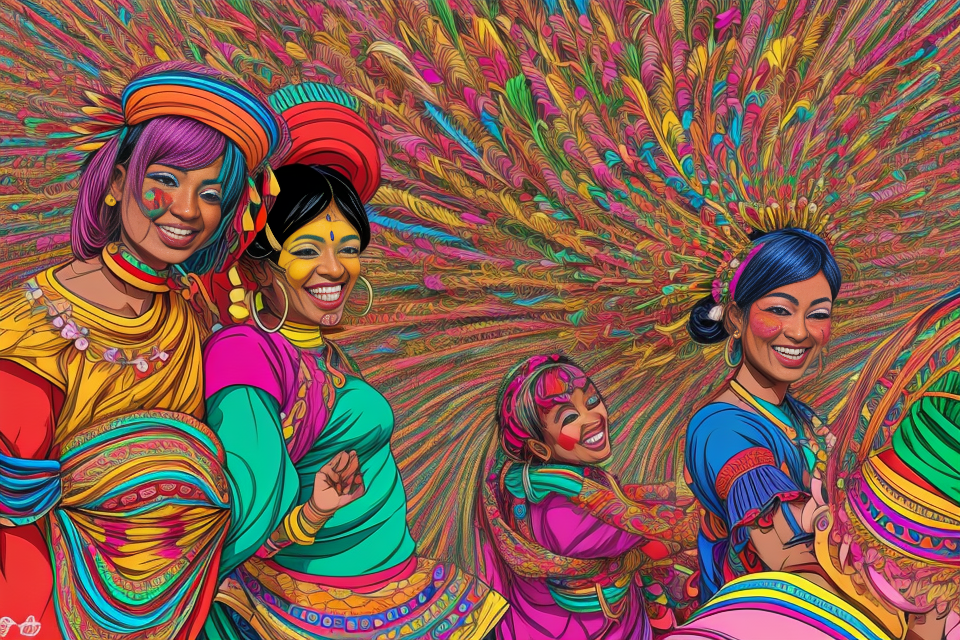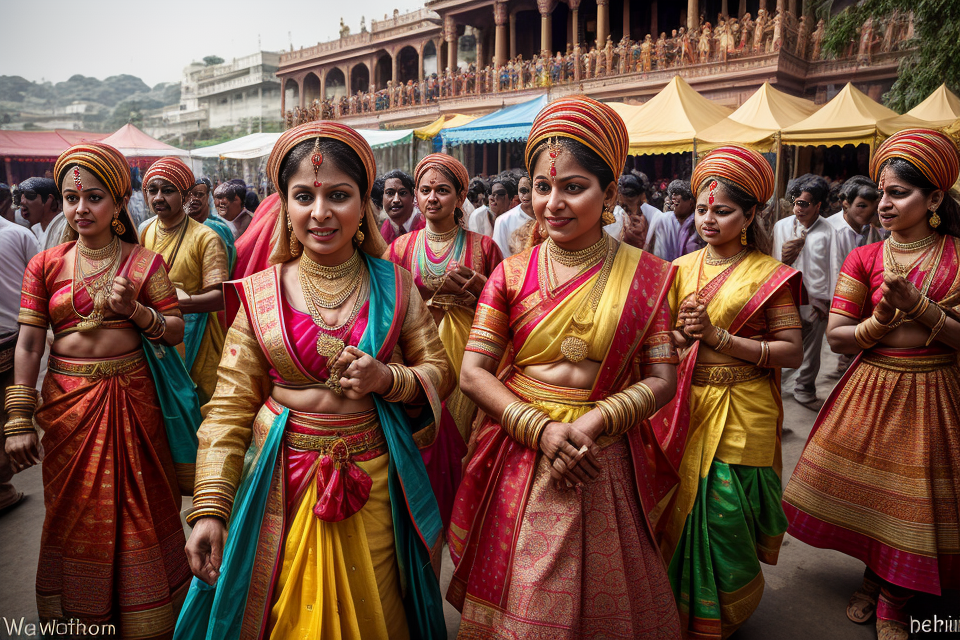Culture events are more than just a gathering of people, they are a celebration of diversity and an opportunity to foster understanding between different communities. In today’s fast-paced and interconnected world, it is more important than ever to embrace and appreciate cultural differences. Culture events provide a platform for people to come together and learn about different customs, traditions, and beliefs. By attending these events, individuals can broaden their horizons and gain a deeper understanding of the world around them.
In this article, we will explore the significance of culture events and why they are essential for promoting diversity and fostering understanding. From music festivals to cultural fairs, every event offers a unique opportunity to learn, grow, and connect with others. So, let’s dive in and discover the power of culture events in creating a more inclusive and tolerant society.
What are Culture Events?
Definition and Examples
Culture events are celebrations or ceremonies that are rooted in the traditions and customs of a particular group or community. These events often serve as a means of preserving and promoting cultural heritage, while also providing an opportunity for people to come together and connect with one another.
Some examples of culture events include:
- Festivals: Events that celebrate a particular season, harvest, or cultural tradition. Examples include the Chinese New Year, Diwali, and Mardi Gras.
- Fairs: Community events that showcase local artisans, food, and entertainment. Examples include the State Fair of Texas and the Renaissance Faire.
- Concerts: Live music performances that feature artists from a particular genre or culture. Examples include the annual jazz festival in New Orleans and the salsa festival in Puerto Rico.
- Parades: Public processions that feature floats, marching bands, and other performers. Examples include the Macy’s Thanksgiving Day Parade and the Rose Parade.
- Ceremonies: Formal events that mark important occasions or transitions in life. Examples include weddings, graduations, and religious rituals.
Culture events provide a platform for celebrating diversity and fostering understanding between different groups of people. By participating in these events, individuals can learn about and appreciate the customs and traditions of others, while also sharing their own cultural heritage with others. Additionally, culture events can help to build community cohesion and promote social inclusion by bringing people together and creating a sense of shared identity and belonging.
The Benefits of Participating in Culture Events
Promoting Cultural Awareness and Understanding
- Understanding different cultures is crucial in today’s globalized world
- The importance of being aware of cultural differences and how they can impact communication and interaction
- The role of cultural awareness in promoting empathy and respect towards people from different backgrounds
- Culture events provide opportunities to learn about different customs, traditions, and beliefs
- Examples of cultural events that showcase various customs and traditions, such as festivals, fairs, and parades
- The value of participating in these events for personal growth and broadening one’s perspective
- The role of cultural events in breaking down stereotypes and promoting cross-cultural dialogue
Strengthening Community Ties
The Role of Culture Events in Fostering a Sense of Community
Culture events provide a platform for people to come together and celebrate their diversity. These events are a way for people to learn about different cultures and traditions, and to appreciate the richness and complexity of human experiences. By participating in culture events, individuals are able to connect with others who share similar interests and values, and to build relationships that transcend cultural boundaries.
How Culture Events Bring People Together and Create a Shared Sense of Identity
Culture events provide an opportunity for people to come together and celebrate their shared identity. These events are a way for people to express their cultural heritage, and to feel a sense of pride and belonging. By participating in culture events, individuals are able to connect with others who share similar cultural backgrounds, and to build relationships that are based on mutual respect and understanding. This shared sense of identity can help to foster a sense of community, and to create a more inclusive and welcoming environment for all.
Supporting Local Economies
Participating in culture events can have a significant impact on local economies. These events not only attract visitors from outside the community but also encourage local residents to spend money on goods and services. In this way, culture events can contribute to the growth and development of local economies.
Here are some of the ways in which culture events support local economies:
- Increased Spending: Culture events often attract visitors from outside the community, who may stay in local hotels, eat in local restaurants, and shop in local stores. This increased spending can have a positive impact on the local economy.
- Boosting Local Businesses: Culture events provide an opportunity for local businesses to showcase their products and services to a wider audience. This can lead to increased sales and a boost in business for local businesses.
- Job Creation: Culture events often require a significant amount of planning and coordination, which can create job opportunities in the community. Additionally, the increased spending associated with culture events can create jobs in industries such as hospitality and tourism.
- Preserving Local Culture: Culture events can help to preserve and promote local culture, which can be an important aspect of a community’s identity. By celebrating and showcasing local culture, culture events can help to foster a sense of community and pride among local residents.
Overall, participating in culture events can have a positive impact on local economies, providing a boost to local businesses and creating job opportunities while preserving and promoting local culture.
The Challenges of Organizing Culture Events
Overcoming Logistical Obstacles
Organizing culture events can be a daunting task, as it involves numerous logistical challenges that must be overcome to ensure the success of the event. These challenges include:
- Venue selection: The venue is a crucial aspect of any culture event, as it needs to be large enough to accommodate the expected number of attendees and offer sufficient space for various activities. Additionally, the venue must be accessible and have adequate parking and transportation options.
- Transportation: Transportation is a critical logistical challenge for culture events, especially if they are held in remote locations or require attendees to travel long distances. Organizers must ensure that transportation options are available and accessible to all attendees, including those with disabilities.
- Scheduling: Scheduling is a critical logistical challenge for culture events, as organizers must coordinate various activities and performances to ensure that the event runs smoothly. Additionally, organizers must take into account the availability of performers, vendors, and other stakeholders, as well as the schedules of attendees who may have conflicting commitments.
Overcoming these logistical obstacles requires careful planning, attention to detail, and effective communication with all stakeholders involved in the event. Organizers must be able to adapt to unexpected challenges and find creative solutions to ensure that the event runs smoothly and meets the needs of all attendees. By overcoming these logistical obstacles, culture events can celebrate diversity and foster understanding, promoting cultural exchange and education for all participants.
Addressing Cultural Sensitivity and Inclusivity
- Understanding cultural differences and avoiding cultural appropriation
- Recognizing the significance of cultural appropriation and its impact on marginalized communities
- Researching and respecting the origins and traditions of various cultures
- Strategies for creating inclusive and respectful culture events
- Collaborating with cultural experts and community members to ensure authenticity and accuracy
- Providing opportunities for diverse groups to participate and contribute
- Encouraging open dialogue and education about different cultures and traditions
- Creating a safe and welcoming environment for all attendees
- Continuously evaluating and improving cultural events to promote inclusivity and cultural sensitivity.
The Enduring Value of Culture Events
- Culture events serve as a means to preserve and promote cultural heritage, fostering a sense of identity and belonging for individuals and communities.
- By celebrating diversity and promoting understanding, culture events help to bridge cultural divides and create a more inclusive society.
- Participating in culture events can increase individuals’ understanding and appreciation of different cultures, leading to greater empathy and tolerance.
- These events can also provide a platform for marginalized communities to share their stories and promote awareness of their experiences, promoting greater understanding and empathy.
- The long-term impact of culture events can be significant, as they can contribute to the preservation of cultural traditions and promote intercultural dialogue and understanding.
FAQs
1. Why are culture events important?
Culture events are important because they celebrate and promote diversity, foster understanding and appreciation of different cultures, and help to create a sense of community and belonging. They provide an opportunity for people to learn about and experience different cultures, traditions, and customs, and to share their own experiences and perspectives with others. Culture events can also help to break down barriers and stereotypes, and to promote tolerance and respect for others who are different from ourselves.
2. What are some examples of culture events?
Some examples of culture events include festivals, parades, cultural fairs, music concerts, dance performances, art exhibitions, and cultural cooking classes. These events can feature food, music, dance, art, and other cultural expressions from different countries or communities, and can be organized by individuals, organizations, or governments.
3. How can culture events benefit individuals and communities?
Culture events can benefit individuals and communities in many ways. They can provide opportunities for people to learn about and appreciate different cultures, and to develop a greater understanding and respect for others who are different from themselves. They can also foster a sense of pride and identity among individuals and communities, and can bring people together to celebrate and share their common heritage and traditions. Additionally, culture events can promote tourism and economic development, and can help to preserve and pass on cultural traditions and knowledge to future generations.
4. What is the role of government in promoting culture events?
Governments can play an important role in promoting culture events by providing funding, support, and resources to individuals, organizations, and communities who are planning and organizing cultural events. They can also provide opportunities for cultural exchange and collaboration between different countries and communities, and can help to preserve and promote cultural heritage and traditions. Additionally, governments can use culture events as a tool for promoting social cohesion, cultural diversity, and international understanding.
5. How can I get involved in culture events in my community?
There are many ways to get involved in culture events in your community. You can attend and support local cultural festivals, parades, and fairs, and you can volunteer your time and skills to help organize and promote these events. You can also join cultural organizations or clubs, and participate in cultural activities and events that are offered in your community. Additionally, you can share your own cultural traditions and customs with others, and encourage others to do the same. By getting involved in culture events, you can help to promote diversity, understanding, and inclusion in your community.


